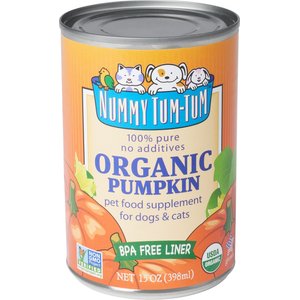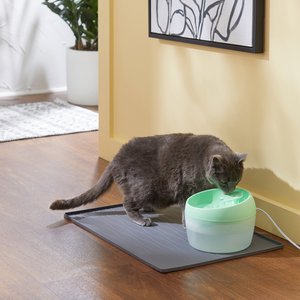Your dog’s poop (or lack thereof) can tell you a lot. While occasional constipation is normal, a healthy dog shouldn’t be struggling to have a bowel movement for an extended period of time. If you notice your pup has hard stools or is straining to defecate, you may be wondering what to give a constipated dog to help them find relief.
Vet experts give their advice on safe home remedies you can try, as well as guidance on when it’s time to go to the vet.
What To Give a Constipated Dog
Click to jump to each section.
Signs Your Dog Is Constipated
Constipation is a general term for difficulty passing stool. The most obvious sign your dog is constipated is a decrease in stool frequency, but there are other, less obvious signals, too.
According to Dr. Andrea Johnston, DVM, a board-certified small animal veterinary internist in Lexington, Kentucky, and medical board member at The Vets, some of the most common signs of constipation include:
- Small, hard or dry stools
- Scooting or rubbing their butt on the ground
- Difficult bowel movements
- Straining in a squatting position without passing stool
- Straining during defecation
- Abdominal discomfort or bloating
- Small amounts of blood in the stool
- Vocalizing while trying to go to the bathroom
- Loss of appetite
- Lethargy
While these are all signs of constipation, Dr. Christine Walters, DVM, head veterinarian at PetWellClinic in Fort Lauderdale, Florida, says these symptoms can indicate other health problems, too. If you notice persistent signs of discomfort, it is important that the dog be evaluated.
Normal stool for a dog is brown, solid and easily comes out in log-like pieces. The size of a dog’s stool is really dependent on the size of the dog, but it should be proportionate to the amount of food they eat.
Causes of Constipation in Dogs
The causes of constipation can run the gamut, from a lack of fiber in the diet to anal tumors that cause a complete blockage in the rectum. In most cases, occasional constipation isn’t a cause for concern, but if you’re noticing other changes to your dog’s health, something else could be going on.
Before jumping into how to help your dog find relief, here are some of the most common causes of constipation:
- Lack of fiber (or too much fiber) in your dog’s diet
- Lack of exercise
- Dehydration or not enough water
- Changes in diet
- Too much dry food
- Physical blockage caused by foreign objects
- Blocked anal glands
- Enlarged prostate gland
- Excessive self-grooming that leads to a blockage
- Side effects of medications, like antihistamines, diuretics or pain relievers
- Hypothyroidism or other hormonal imbalances
- Megacolon (larger than normal colon)
- Other colon issues
Older dogs are also more likely to develop constipation. This can be due to electrolyte imbalances, kidney problems and/or an enlarged prostate.
Home Remedies for Constipated Dogs
When you notice changes in your dog’s bathroom habits, it’s normal to want to help them find relief at home.
For starters, feed a dog a high-quality diet with fiber; make sure they get plenty of water and exercise; and prevent them from eating non-food items.
Dr. Johnston recommends the following home remedies to help your dog move things along.
1. Fiber
Purchase high-fiber dog food, like Royal Canin's Veterinary Diet Gastrointestinal Dog Food, or add canned plain pumpkin (not pumpkin pie filling), like Nummy Tum-Tum's Organic Pumpkin, to your dog's food to naturally increase the fiber content. Per the Merck Veterinary Manual, add 1 to 4 tablespoons of pumpkin per meal.
You can also purchase fiber supplements, Like Native Pet's Organic Pumpkin Fiber Supplement—but these shouldn’t take the place of a healthy, balanced diet.
Check with your vet before giving your dog new foods or supplements.
2. Hydration
Water helps bulk the stools and lubricate the digestive tract, which makes stools easier to pass. Ensure your dog has access to fresh water at all times and is drinking it.
A water fountain may help entice your dog to drink more water.
3. Exercise
Regular physical activity can help stimulate bowel movements.
Take your dog on a 15- to 30-minute walk every day, if possible.
4. Probiotics
Probiotics aren’t a quick fix, but over time they may help alleviate constipation in dogs. They also have other health benefits: They can balance the gut microbiome, support the immune system and protect against urinary tract infections.
Speak to your vet before giving your dog probiotics.
5. Stool Softeners
You can add powdered stool softeners, like the Bark & Spark Pumpkin Powdered Stool Softener, to your dog’s food to help make the stool easier to pass.
How to Make a Constipated Dog Poop Quickly
Alleviating constipation is more of a long game. Dr. Walters says there are no quick fixes and that prevention is best. That being said, there are things you can try.
- Olive oil or coconut oil: A small amount of olive oil or coconut oil can soften the stool and lubricate the digestive tract, making it easier to go to the bathroom. But you have to be mindful of how much you’re giving your dog. Small dogs can generally tolerate about 1/2 a teaspoon, while big dogs can take up to 2 teaspoons per day. This shouldn’t be a regular thing, though. Too much fat can bother your dog’s stomach and cause diarrhea. Speak with your vet beforehand.
- Dog laxatives: Stimulant dog laxatives generally require prescriptions, so you’ll need vet approval. If you’re concerned about getting your constipated dog to poop quickly, check with your vet to see if they prescribe something that could address your dog’s needs.
A quick internet search will reveal that people recommend giving your dog milk, since many dogs are lactose intolerant. But Dr. Walters advises against this, saying it can upset your dog’s digestive system and cause diarrhea, which can come with problems of its own.
When to See a Vet for Dog Constipation
If your dog goes more than two days without pooping or you notice their poop is generally small, hard and/or difficult to pass, Dr. Walters recommends an evaluation from your vet. Your vet can help figure out what is going on and help your dog get back to pooping as soon as possible.
Typically, your vet will do a physical exam and may order additional testing, such as imaging (X-rays), bloodwork and/or urine testing. The next step is a treatment plan based on the results from these tests.
Dog Constipation Treatment
Treatment for your dog’s constipation depends on the underlying cause. If your vet uncovers a medical issue, treatment will focus on correcting that issue and providing supportive care in the meantime.
Generally, constipation can be corrected with some mostly noninvasive methods, including:
- Laxatives or stool softeners: Dr. Johnston says a vet will prescribe laxatives or stool softeners specifically for your dog. You shouldn’t give your dog laxatives or stool softeners without vet approval.
- Enemas: Again, these will be administered by your vet, and you shouldn’t try to give your dog an enema on your own.
- Fluid therapy: If your vet suspects dehydration, they may recommend fluid therapy. This can be intravenous (injected in the veins directly) or subcutaneous (administered directly under the skin) depending on how severe the constipation is.
- High-fiber diet: Dietary fiber helps move things through your dog’s digestive tract, so making sure they’re getting enough fiber can help alleviate chronic constipation. Dr. Johnston says your vet may recommend a prescription diet that has increased fiber or water content.
- Other dietary changes: Changing your dog’s diet can have a big impact on constipation and other digestive issues. If your dog eats mostly kibble, your vet may suggest switching to canned dog food, which contains more moisture.
However, some causes, like obstipation (complete constipation), and/or blockages may require surgery or manual removal of impacted feces to get things moving again. This all depends on the severity of the condition, Dr. Walters says.
Because of this, get your dog to the vet as soon as you notice something is off. This can reduce the chances of a minor problem becoming worse.
FAQs about Dog Constipation
Q:
How long can a dog go without pooping?
Q:
Is there a natural laxative for dogs?
Q:
Can milk help dogs with constipation?
Q:
Does apple cider vinegar help dog poop?
Q:
What human medicine can I give my dog for constipation?
More about dog poop:
Share:

















